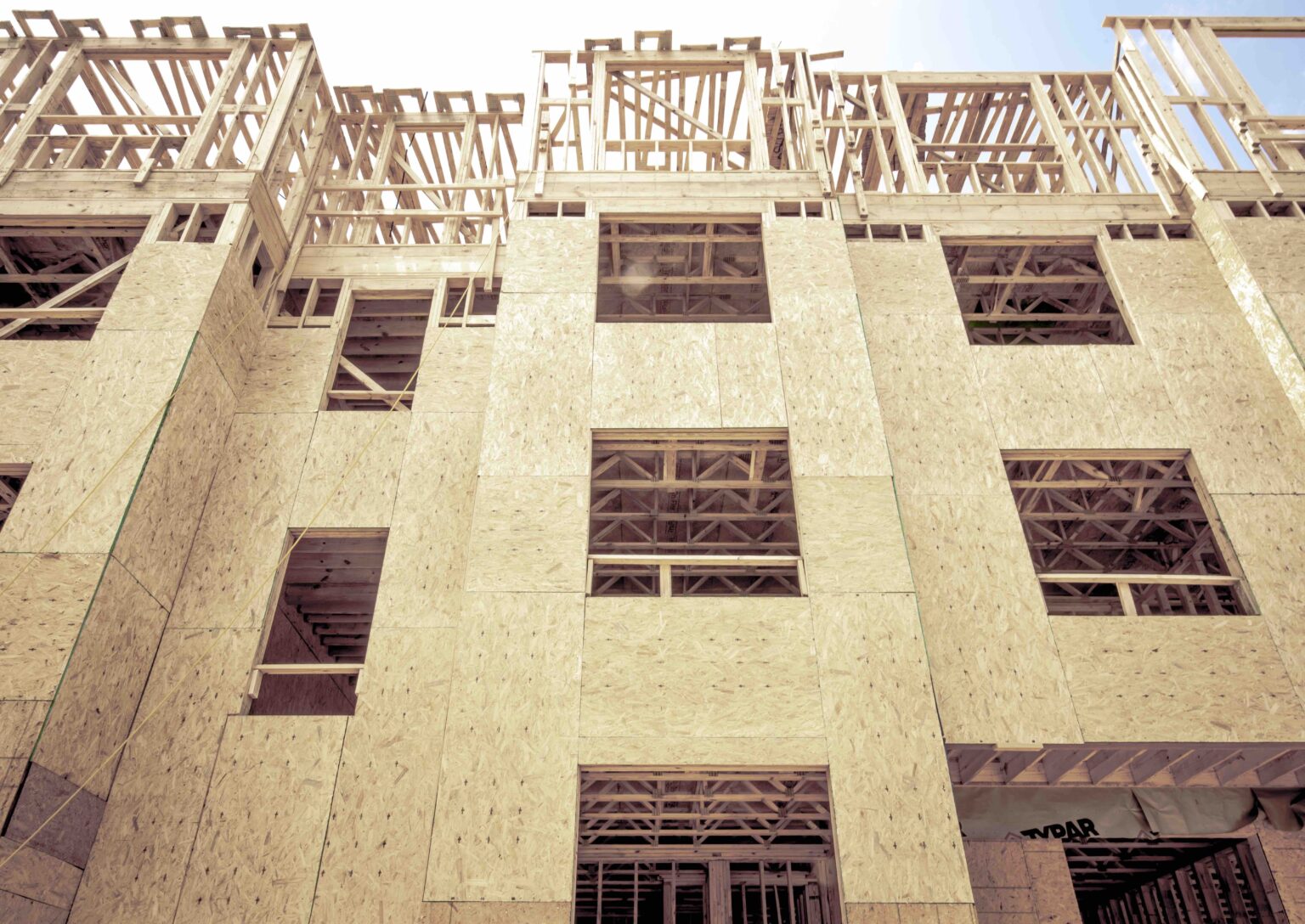
Wooden Frame of Multi-Family Housing Project , depicting Architectural Shapes and Patterns.
Dan Reynolds Photography / Getty Images
Editor’s note: The Capital Chronicle has launched a $10,000 end-of-year fundraising campaign to help us continue our first-class coverage next year. A lot is at stake, and there’s a long legislative session in 2025. We’re completely dependent on donor dollars, which are tax deductible. Please contribute to us if you can.
Oregon lawmakers this week previewed some of their ideas to build more homes and lower rents and home prices for Oregonians struggling with the high cost of housing.
During committee hearings at the state Capitol on Tuesday and Wednesday last week, lawmakers discussed proposals to limit rent increases for mobile home parks, build more condos and crack down on landlords pocketing deposits. All are aimed at easing pressures that result in more than half of all renters and a third of homeowners spending more than 30% of their income on housing costs, according to a recent report from the Oregon Housing and Community Services.
Here’s a look at some of the housing bills lawmakers plan to introduce next year:
Rent limits for mobile home parks
Current state law limits annual rent increases for buildings older than 15 years to no more than 10% or 7% plus inflation, whichever is less. Rep. Pam Marsh, D-Ashland and chair of the House Housing and Homelessness Committee, plans to introduce a bill to further limit rent increases in manufactured home parks and marinas.
Oregon has 1,328 manufactured home parks with more than 72,000 spaces, according to Lane County legal aid attorney and Oregon State Tenants Association vice president John VanLandingham. Most people living in those parks own their homes but rent the land. The roughly 25 marinas in the state that have floating homes operate similarly — people rent boat slips, like parking spaces on the water and live in houseboats.
“Our focus is entirely on rent increases, because that is the issue that is scaring the pants off of all manufactured home park tenants across the state,” VanLandingham said.
Marsh’s proposal would limit rent increases on manufactured home parks and marinas to no more than the rate of inflation. That, VanLandingham said, would bring potential rent increases more in line with the cost of living increases manufactured homeowners on fixed incomes see from Social Security. Many manufactured homeowners are seniors or farmworkers.
Easier path to building condos
Unlike traditional single-family homes, condominiums let people buy an individual unit in a building. They’re typically cheaper than other types of homes: The median cost of a condo in Oregon was $341,000 in 2023 compared to the median price of $552,460 for a single-family home.
But condo construction has plummeted from a peak of about 4,200 new units in 2006 to just 309 last year — a 92% drop.
“We aren’t building condos in Oregon anymore, and we haven’t for years,” said Sen. Mark Meek, a Gladstone Democrat and real estate agent.
He attributed that decrease in large part to restrictive state laws that give property owners more time to file complaints or lawsuits against construction companies than they have in other states. A 2018 report from ECONorthwest found that Oregon’s 10-year time limit for property owners to file claims over construction defects was higher than other West Coast states. Between the risk of lawsuits and apartment rents increasing, developers and lenders have seen regular apartment buildings as a safer and more profitable option compared to condos.
Meek’s proposed bill would decrease that limit from 10 years to six years and require more robust inspections of condo exteriors, which he said would reduce the risk of defects. He said the proposal, backed by developers and Rep. Vikki Breese-Iverson, the Republican vice chair of the House Housing and Homelessness Committee, was the kind of bold but practical solution demanded by the state’s housing crisis.
Cracking down on ‘hold deposits’
Many landlords charge “holding” deposits, typically at least several hundred dollars and sometimes as high as a month’s rent, to future tenants to secure an apartment while working out lease details and a move-in date. If a tenant moves in, that deposit is usually credited toward their first month’s rent, security deposit or other move-in costs — but if a tenant can’t move in, they often lose that money.
Rep. Annessa Hartman, D-Gladstone, plans to introduce a bill to limit landlords’ ability to keep those deposits. Hartman’s measure would require landlords to immediately refund the deposit and pay a penalty equal to the amount when they fail to provide a lease, such as by overbooking a rental unit or trying to rent a unit that doesn’t meet state standards for habitability.
Air conditioning apartments
After changing state law two years ago to require landlords to allow tenants to use air conditioning units, lawmakers are looking at requiring indoor cooling in all apartments with 10 or more units.
The Senate Housing and Development Committee will introduce a bill to require landlords to provide central air, portable air conditioning devices or other passive cooling to keep each bedroom at a temperature 15 degrees below the outdoor temperature and not higher than 80 degrees. Otherwise, landlords would have to provide tenants with access to a community cooling space on or near the apartment premises that maintains a temperature below 80 degrees.
Oregon and other states have long required that landlords provide heat in rental properties so tenants can have a minimum indoors temperature of 68 degrees. Debates over landlords’ responsibilities for cooling units have taken off in recent years as Oregon experiences more extreme heat tied to climate change. About 100 Oregonians died during a 2021 heat dome event, and Salem, Eugene and Hillsboro broke record high temperatures in a heat wave this July.
This republished story is part of OPB’s broader effort to ensure that everyone in our region has access to quality journalism that informs, entertains and enriches their lives. To learn more, visit our journalism partnerships page.


